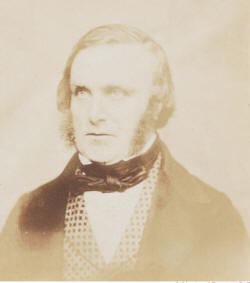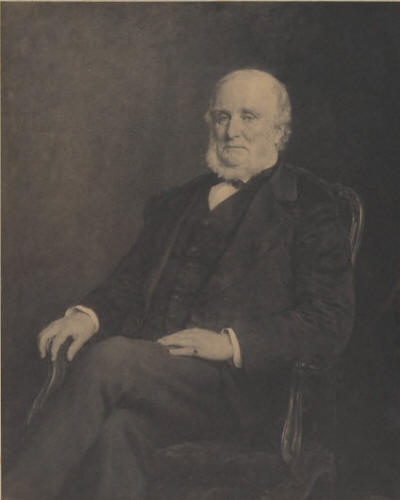Queer Places:
Eton College, Windsor, Windsor and Maidenhead SL4 6DW
Charterhouse School, Charterhouse Rd, Godalming, Surrey GU7 2DX
University of Cambridge, 4 Mill Ln, Cambridge CB2 1RZ
Llysdinam
Hall, Newbridge-on-Wye.
All Saints Churchyard
Newbridge on Wye, Powys, Wales
 George Stovin Venables (June
18, 1810 – October 6, 1888), born in Wales, was a journalist and a barrister at the English bar.
He was part of the Cambridge
Apostles. He was a good friend with many leading figures of the day, such as William Thackeray,
Alfred, Lord Tennyson and Sir
James Fitzjames Stephen.
George Stovin Venables (June
18, 1810 – October 6, 1888), born in Wales, was a journalist and a barrister at the English bar.
He was part of the Cambridge
Apostles. He was a good friend with many leading figures of the day, such as William Thackeray,
Alfred, Lord Tennyson and Sir
James Fitzjames Stephen.
George Stovin Venables was born at Kirkthorpe, the son of Richard Venables, vicar of Nantmel and then archdeacon of Carmarthen, and for twenty-five years chairman of the Radnorshire quarter sessions. His mother was Sophia, daughter of George Lister of Girsby, Lincolnshire.[1] He was educated at Eton College and Charterhouse School, the latter at the same time as William Makepeace Thackeray, whose nose was broken in a fight between them. He proceeded to Jesus College, Cambridge. At Cambridge, he won the Chancellor's Gold Medal for poetry in 1831,[3] and was a Cambridge Apostle from 1832.[4] He became a Fellow of Jesus College.
He was called to the Bar at the Inner Temple in 1836, and was in practice for over 40 years. For more than thirty years, he made regular weekly contributions to the Saturday Review. He also, for twenty-five years from 1857, compiled a summary of the year's events that was published in The Times on the last day of the year. Other journals to which Venables contributed include the Literary Review, the Victoria Regia and Macmillan's Magazine.
His literary connections included his time at Charterhouse with William Makepeace Thackeray; the character George Warrington in Pendennis is said to be based on Venables.[5][6] A friendship with
Alfred, Lord Tennyson arose from Cambridge days.[7] He wrote an anonymous book of verse Joint Compositions (1848) with Henry Lushington. He was an early and favourable reviewer of Thomas Carlyle, another friend.[8]
The impression made by Venables upon many of the most distinguished of his contemporaries was that he was almost without an equal in the extraordinary force and charm of his character. A year before his death some of his friends erected a window as a memorial of Venables and his two brothers (the Rev. Richard Venables of Llysdinam Hall, and Joseph Henry Venables, 1813–1866, barrister-at-law) in the church at Llysdinam, which he had built and endowed. It is inscribed ‘Conditori hujus ecclesiæ amicissimi quidam.’ Upon this occasion Sir James Fitzjames Stephen [q. v.], in a letter of warm eulogy, saluted Venables as ‘a sort of spiritual uncle or elder brother.’ Thackeray is alleged to have founded upon Venables the character of George Warrington in ‘Pendennis.’ Lord Tennyson accepted from him a line in ‘The Princess,’ which is dedicated to Venables's most intimate friend,
Henry Lushington.
A portrait of him by the Hon. John Collier is at Llysdinam, Newbridge-on-Wye.

George Stovin Venables
by Frederick Hollyer, after John Collier
photogravure, (1879)
23 in. x 17 7/8 in. (583 mm x 455 mm) paper size
Given by Ursula Grant Duff (née Lubbock), 1957
Reference Collection
NPG D39227
My published books:


BACK TO HOME PAGE

 George Stovin Venables (June
18, 1810 – October 6, 1888), born in Wales, was a journalist and a barrister at the English bar.
He was part of the Cambridge
Apostles. He was a good friend with many leading figures of the day, such as William Thackeray,
Alfred, Lord Tennyson and Sir
James Fitzjames Stephen.
George Stovin Venables (June
18, 1810 – October 6, 1888), born in Wales, was a journalist and a barrister at the English bar.
He was part of the Cambridge
Apostles. He was a good friend with many leading figures of the day, such as William Thackeray,
Alfred, Lord Tennyson and Sir
James Fitzjames Stephen.

